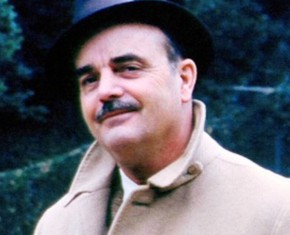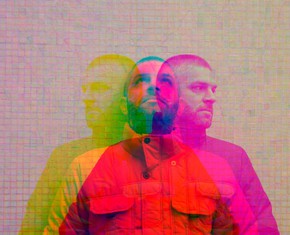The views expressed in our content reflect individual perspectives and do not represent the authoritative views of the Baha'i Faith.
My dad passed from this world in 1985—and now I’m older than my father at the time of his death.
In his younger years, his alcoholism and erratic behavior affected me deeply as a child. In 1959 he awoke one morning writhing in agony. “Call an ambulance!” he fairly shouted at me. At the hospital, he was diagnosed with pancreatitis and underwent emergency surgery. He survived—and, remarkably, turned his back on alcohol for good.
At his memorial gathering, I was asked to say a few words. His wife had embalmed him and kept an open casket in her church. Recalling his sacrifices in the Great Depression and the Second World War, I considered that he had had two conversions in his life: giving up strong drink and joining the Baha’i Faith.
As a Christian in his earlier days, my dad had anticipated that Christ’s return would be heralded by extraordinary heavenly events, such as his descent from heaven in the clouds and the falling of stars upon the Earth.
As an armchair Biblical scholar, however, he was conflicted by the condition of the Jews 2,000 years ago. According to the Old Testament prophecies, the Jews had anticipated that the Messiah would come from an unknown place, sit upon the throne of David, fulfill the law of the prophets, rule with a scepter of iron, conquer the East and the West, initiate a reign of peace, and glorify the chosen people—the Jews.
But when Jesus appeared as their Messiah, the Jews observed that he came from a known place. He did not sit upon the throne of David. He had no place to lay His head. He broke the Sabbath Day. He carried no sword. He did not conquer the East and the West. He did not inaugurate a reign of peace, nor did he exalt the Jews. When Jesus told them that he came down from heaven and at the same time was in heaven, they were outraged and crucified him.
Dad concluded that if Christ did fulfill the messianic prophecies in the Old Testament, he did so symbolically, not literally. The spirit of Christ came down from heaven, his throne an eternal one. He reformed the law of Moses. His sword was his word, which eventually did conquer the East and the West. His reign of peace brought together warring tribes under the banner of Christianity—and he exalted those Jews who saw the deeper symbolic meaning of his teachings and followed him.
Dad realized that many Christians accept that Christ’s first coming did not fulfill the Old Testament messianic prophecies literally—but contrarily, many also believe that his second coming will be fulfilled literally. Could His second coming, my father wondered, be missed by the followers of Christ—who, like the Jews 2,000 years ago, misread the symbols woven into Biblical scriptures?
My father understood that the Biblical prophecies from the books of Isaiah and Revelation meant that the world would not end literally, but rather symbolically. He knew the Biblical verses referring to signs of Christ’s second coming and the end of the world from his King James Bible, such as the following:
And as he sat upon the mount of Olives, the disciples came unto him privately, saying, Tell us … what shall be the sign of thy coming, and of the end of the world? – Mathew 24:3.
Translated from Greek in the 17th century, New Testament scholars took the word aion to mean world; hence, end of the world. Dad realized that another interpretation of aion is eon; hence, end of the eon.
In 1978 the New International Version (NIV) of the Bible was published. In this version, scholars used the earliest, highest quality manuscripts available from the Greek New Testament and the Hebrew and Aramaic Old Testament. In the NIV version, Mathew 24:3 reads:
As Jesus was sitting on the mount of Olives, the disciples came to him privately. “Tell us … what will be the sign of your coming and the end of the age?”
The Baha’i teachings describe two great historic ages in the history of humanity: the first age is prophetic, and the second fulfills those prophecies. So, when Christ taught his followers to pray for the kingdom of God on Earth, he prophesized that age of fulfillment.
Dad believed that both Isaiah, the prophet, and John, the apostle, provided a vision of that coming kingdom, even though humankind in a nuclear age possesses the power to destroy the world:
And he shall judge among the nations and shall rebuke many people: and they shall beat their swords into plowshares, and their spears into pruninghooks: nation shall not lift up sword against nation, neither shall they learn war any more. – Isaiah 2:4.
And I saw a new heaven and a new earth: for the first heaven and the first earth were passed away. – Rev 21:1.
In tracing the great redemptive plan of God, he learned the Baha’i teaching that the Creator does not leave humanity comfortless, but comes again and again and again. Through a succession of great teachers or messengers known by their fruits, he understood that they reveal the regenerative word of God.
After he became a Baha’i, Dad realized that the time of trouble anticipated by Christ in the “Last Days” would come as a consequence of humanity’s turning away from God. Through the commission of unrighteous acts, mankind would gradually find itself unable to bear the consequences of its misdeeds. Through an apocalyptic process, the human race, far from destroying itself, would emerge chastened and unified—and, as Baha’u’llah prophesized, establish that kingdom of God on earth anticipated by Christ 2,000 years ago:
That all nations should become one in faith and all men as brothers; that the bonds of affection and unity between the sons of men should be strengthened; that diversity of religion should cease, and differences of race be annulled … so it shall be; these fruitless strifes, these ruinous wars shall pass away, and the Most Great Peace shall come. – Baha’u’llah, The Proclamation of Baha’u’llah, p. viii.
When my father wrote me in 1967 about his becoming a Baha’i, it touched my heart. That same year, I too accepted Baha’u’llah’s Faith.
















Comments
Sign in or create an account
Continue with Googleor